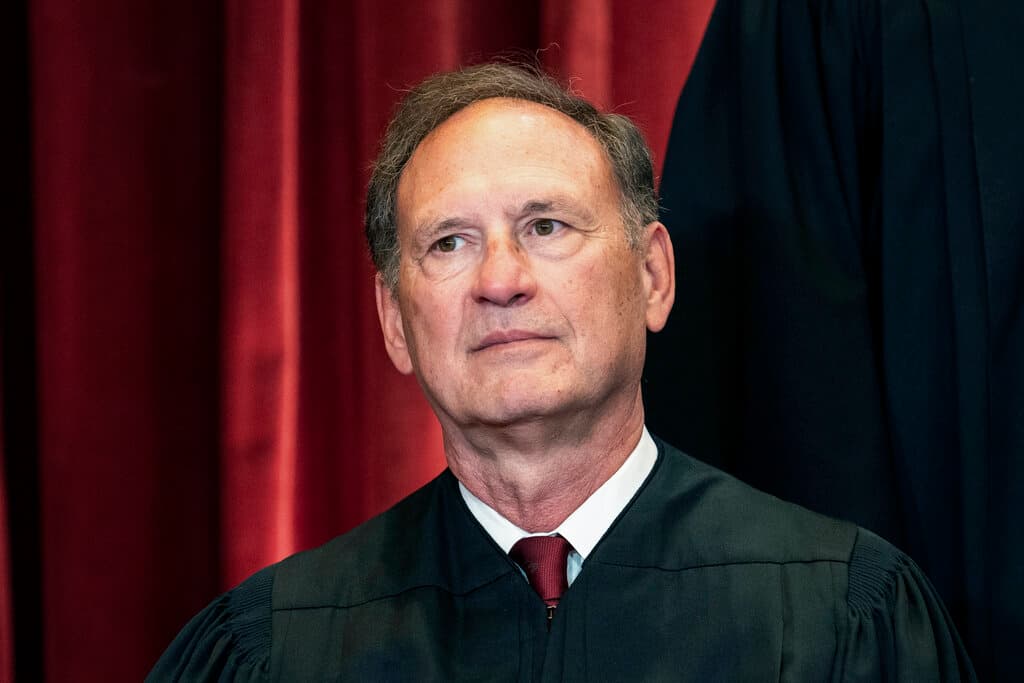Senator Whitehouse Accuses Justice Alito of an ‘Organized Campaign’ Fueling Obstruction of Efforts by Congress To Impose an Ethics Code on the Court
The Rhode Islander, whose legislation is likely to pass neither the House nor Senate, takes an ad hominem turn against a sitting justice with whose jurisprudence the senator disagrees.

The complaint against Justice Samuel Alito, filed with Chief Justice Roberts by Senator Whitehouse, represents an escalation by the senator of a confrontation between Congress and the Supreme Court that in scope is constitutional and in method ad hominem.
Mr. Whitehouse floats an explosive allegation — that the justice participated in an “organized campaign to block congressional action with regard to a matter in which he has a personal stake.” He allows that, at best, the justice was “unwittingly used to provide fodder” to stymie Mr. Whitehouse’s work.
Then again, too, Mr. Whitehouse is pushing legislation that would empower lawmakers to impose an ethics code on the high court. So he is using his own complaint in an effort to affect how the court might rule. It is aimed at an interview Justice Alito gave to a newspaper, the Wall Street Journal, in which he reckons that “no provision in the Constitution” gives Congress the “authority to regulate the Supreme Court — period.”
This pits one of the court’s most vituperative senatorial critics and one of the court’s most outspoken justices. The senator alleges that Justice Alito “expressed an opinion on a matter that could well come before the Court.” Whether that is improper in and of itself, though, is far from the settled matter that Mr. Whitehouse portrays.
As is the constitutionality of Mr. Whitehouse’s own proposed legislation, the Supreme Court Ethics, Recusal, and Transparency Act. That measure advanced out of the Senate Judiciary Committee along party lines by the slimmest of margins — one vote — a week before the justice was interviewed by James Taranto and David Rivkin.
Mr. Whitehouse cites the Code of Conduct for United States Judges, which does not — yet — bind Supreme Court justices for the proposition that a jurist “should not make public comment on the merits of a matter pending or impending in any court.” It is yet to be determined whether the court can be bound by an ethics code established by another branch.
Mr. Whitehouse also cites federal recusal law, which does bind justices, that mandates judges stepping aside in cases in which their “impartiality could reasonably be questioned.” It is up to the justices themselves, though, to determine when that bar has been cleared. Other justices may not force a colleague to recuse himself or herself.
The senator tells the chief justice that “making public comments assessing the merits of a legal issue that could come before the Court undoubtedly creates the very appearance of impropriety these rules are meant to protect against.” He also quotes Justice Neil Kavanaugh’s observation that “as Justice Ginsburg said, no hints, no forecasts, no previews.”
That doctrine, though, is nowhere established in the Constitution and would eventually probably have to be decided by the court itself. All of the justices have voted on cases involving issues — abortion, say, or race relations or taxation — where their own opinions might be deeply held, their interests sharply affected, and their views expressed publicly.
Justice Alito’s sit-down with the Journal came on the heels of a report in ProPublica that he had accepted, but not disclosed, luxury fishing trips with a billionaire hedge fund manager, Paul Singer. Now, Mr. Whitehouse alleges that those comments “may well embolden legal challenges” and “fuel obstruction” to his bill.
Mr. Whitehouse depicts a troika of Justice Alito, Mr. Rivkin, and a conservative judicial activist, Leonard Leo — a client of Mr. Rivkin’s — as implementing an “obstructive campaign” against his lawmaking. The Senate committee is investigating Mr. Leo for facilitating Justice Alito’s trips with Mr. Singer.
The senator’s letter to Chief Justice Roberts asks him to “take whatever steps are necessary to investigate this affair and provide the public with prompt and trustworthy answers.” It might well be, though, that the chief justice will conclude that it is not necessary or appropriate to investigate the affair, lest the investigation itself become a method for thwarting a full and independent hearing by the court.

